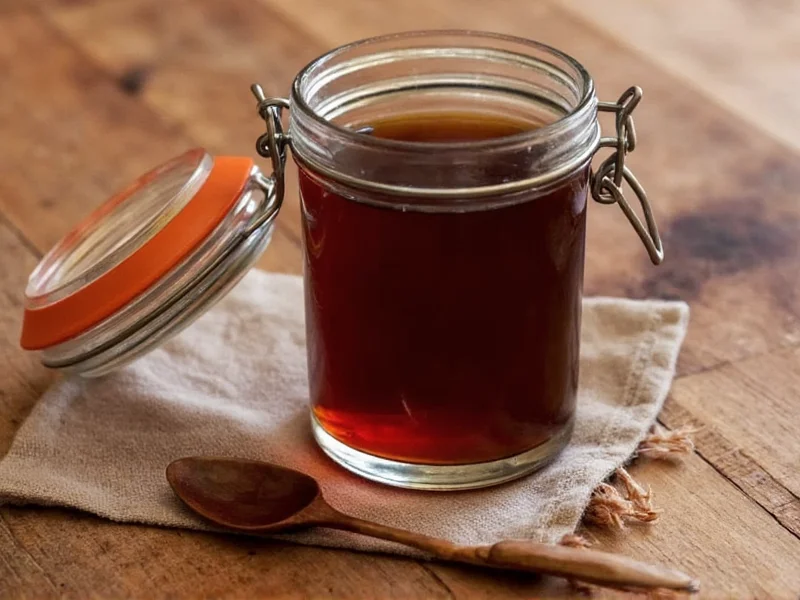Understanding proper molasses storage prevents unnecessary kitchen clutter while ensuring you always have this versatile sweetener ready for baking, marinades, and holiday recipes. The question do molasses need to be refrigerated frequently puzzles home cooks who notice varying recommendations across different brands and recipes.
Why Molasses Stays Fresh Without Refrigeration
Molasses' remarkable shelf stability comes from its chemical composition. With sugar concentrations typically exceeding 75%, it creates an environment where microorganisms struggle to survive. This natural preservation method works similarly to honey and other high-sugar syrups. The low water activity level (aw) in molasses—usually below 0.75—further prevents microbial growth that causes spoilage in most perishable foods.
Optimal Storage Conditions for Molasses
For best results when storing molasses without refrigeration, follow these guidelines:
| Storage Condition | Expected Shelf Life | Quality Considerations |
|---|---|---|
| Unopened container at room temperature | 1-2 years past "best by" date | Maintains original flavor and consistency |
| Opened container at room temperature | 6-12 months | May gradually thicken; flavor remains stable |
| Opened container refrigerated | 1-2 years | Easier pouring; preserves original texture longer |
When Refrigeration Becomes Beneficial
While answering does opened molasses need to be refrigerated, consider these scenarios where chilling provides advantages:
- Extended storage needs - If you won't use your molasses within six months, refrigeration maintains pourability
- Warm kitchen environments - Temperatures consistently above 75°F (24°C) accelerate thickening
- Humid climates - High humidity can cause slight moisture absorption over time
- Preventing crystallization - Refrigeration slows sugar crystal formation that makes molasses difficult to pour
Recognizing Spoiled Molasses: What to Look For
Molasses rarely spoils due to its preservative properties, but improper storage can lead to quality issues. Check for these signs when determining if molasses has gone bad:
- Mold growth - Any visible mold means immediate discard
- Unusual odors - Sour or fermented smells indicate spoilage
- Significant texture changes - Extreme hardening that doesn't improve with warming
- Off flavors - Bitter or sour taste compared to original
Remember that natural separation or slight darkening doesn't indicate spoilage—these are normal characteristics of pure molasses.
Different Molasses Types and Their Storage Needs
All varieties—light, dark, and blackstrap—share similar storage requirements when addressing do different types of molasses need refrigeration. However, subtle differences exist:
- Light molasses - Most delicate flavor; benefits slightly more from refrigeration for extended freshness
- Dark molasses - Robust flavor holds up well at room temperature
- Blackstrap molasses - Strongest flavor and highest mineral content; maintains quality longest at room temperature
Practical Tips for Maintaining Molasses Quality
Whether you choose to refrigerate molasses or not, these practices help maintain quality:
- Always use clean, dry utensils - Prevents moisture introduction that could encourage mold
- Tighten lids securely - Minimizes air exposure that causes gradual thickening
- Store in original container - Glass or plastic containers designed for syrup provide optimal protection
- Warm thickened molasses - Place sealed container in warm water bath for 10-15 minutes if it becomes too viscous
Common Misconceptions About Molasses Storage
Several myths persist around molasses refrigeration requirements. Let's clarify:
- "Molasses must be refrigerated after opening" - False; this is a precautionary recommendation, not a requirement
- "Refrigeration ruins molasses flavor" - Incorrect; chilling preserves flavor compounds longer
- "All syrups need refrigeration" - Not true; maple syrup requires refrigeration after opening while molasses does not
Final Storage Recommendations
For most home kitchens, storing molasses in a cool, dark pantry provides sufficient quality for regular use. If you're wondering should i refrigerate molasses after opening, consider your usage patterns: refrigerate if you use it infrequently or live in a warm climate, but room temperature storage works perfectly well for most households. The key is consistency—once you choose a storage method, stick with it to prevent temperature fluctuations that accelerate quality changes.











 浙公网安备
33010002000092号
浙公网安备
33010002000092号 浙B2-20120091-4
浙B2-20120091-4